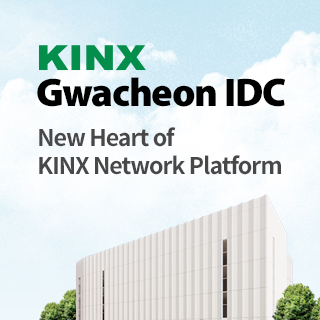Kubernetes getting started
quickly and easily.
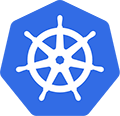
It is no longer difficult with
‘IXcloud® Kubernetes’ getting started
quickly and easily.
Are you hesitant to adopt Kubernetes because of its high difficulty and complexity?
IXcloud makes Kubernetes easy.
IXcloud Kubernetes Service (IKS) automates all processes required to get started with Kubernetes,
from cluster installation, configuration, and deployment. Get started now with IXcloud Kubernetes.
![]()
Deployment and management of one-click clusters
Complete configuration and deployment of clusters with one click.
![]()
Auto-scaling(expanding and contracting)of pods
Auto-scaler that automatically expands and contracts pods as needed with real-time monitoring
![]()
A to Z Guide on Kubernetes
Provides detailed guides from Kubernetes concepts to tutorials, including YAML files
![]()
Compatible with standard Kubernetes
CNCF-certified; compatible with standard Kubernetes environment; Kubernetes standard APP and SW can be utilized
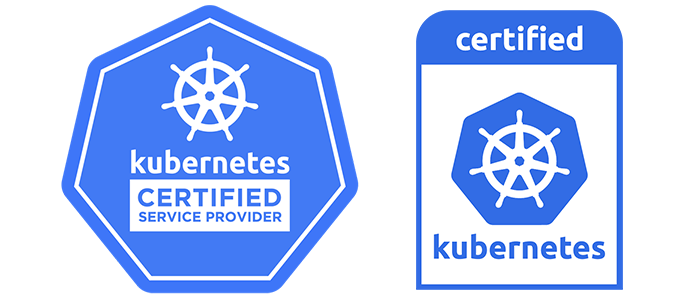
The Kubernetes Certified Service Provider (KCSP) is a certification given to companies that are equipped with the competence and experience to perform Kubernetes professional services.
In order to obtain the KCSP certification the following 3 requirements must be met.
1) The company must be a member of the Cloud Native Computing Foundation (CNCF)
2) Have a certain number of engineers who are certified as Certified Kubernetes Administrator (CKA)
3) Pertain a certain level of recognized technical skills & safety
On the other hand, the CK certification is given to those services that have passed the CKCP (Certified Kubernetes Conformance Program) conformity program.
IXcloud Kubernetes Service provides enterprise-grade services based on the Kubernetes expertise certified by CNCF.
One of the biggest differences between Kubernetes and other clouds is the durability and elasticity of the service environment.
In a typical cloud environment, the failure of just one instance can affect the entire service.
By contrast, in a Kubernetes environment, pods have respective roles and run independently from other nodes(instances).
Thus, even in an event of a node fail, the continuity of the service is not depreciated as new pods are automatically deployed to replace the troubled pods.
In addition, Pods are automatically added or deleted accordingly to the environment value set, guaranteeing faster responses than instance autoscaling.
Expanding or recovering failures can much smoothly be done.
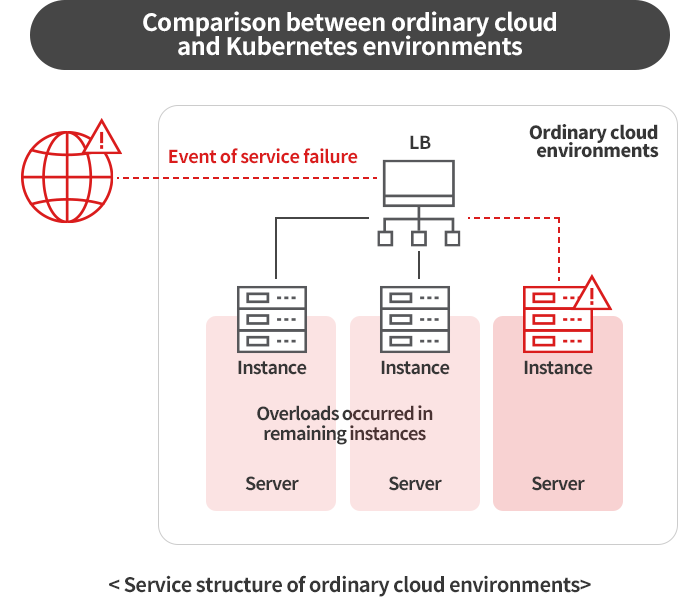
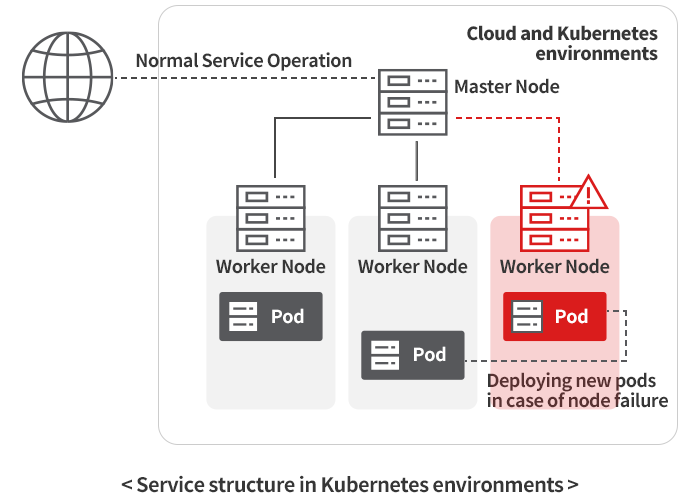
![]()
Creating clusters within a click
Simply create a cluster from the IXcloud console without the cumbersome process. A cluster can be directly created with the default values suggested by the console. Then, grasp Kubernetes operations at a glance through the monitoring dashboard.
![]()
A quick and easy container registry
*Soon to be released
A container registry helps you store and manage container images separately. Images can be securely stored and managed in a private registry with fast scale-out. You can use a container registry, which is essential for building a CI/CD pipeline, immediately without having to build it.
![]()
Hands-free Pod Auto-scaler
Frustrated from managing resources for your service operation? Simply manage with the help of IKS Auto-scaler. IKS's Auto-scaler automatically expands and contracts the number of pods through real-time monitoring. This enables you to be prepared for unexpected loads and can help you reduce costs and ensure high availability.
release cycle (CI/CD)
For services with a short product release cycle, fast build and deployment of service code is essential. The need of a CI/CD environment that automates code integration and deployment is surely in required.
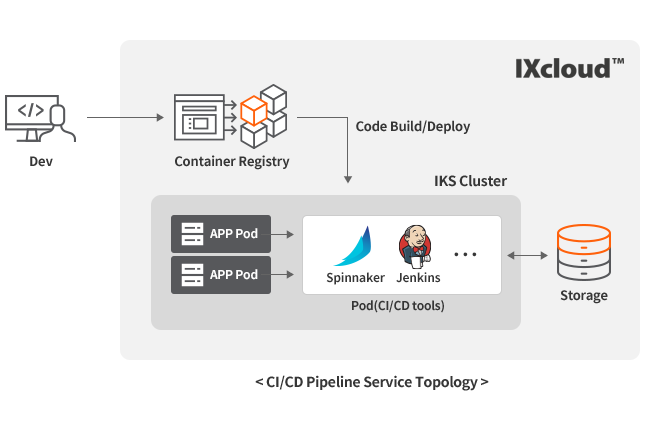
Try to configure the services with our CI/CD tools-installed IKS cluster and container registry.
Accelerate time-to-market and improvement of services by automating the code building, testing, and deployment that are required to release applications.
You can also create, deploy, and delete new pods in seconds by micro-scaling your services into Kubernetes pods and speeding up your works.
* Continuous Integration, Continuous Delivery
If multiple teams are managing the service together, multiple clusters will be in operation. This means, applications may need to be run on a new cluster from time to time.
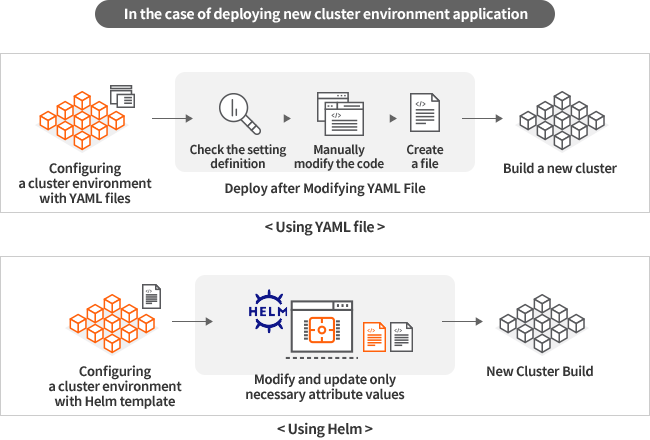
It is cumbersome to build applications using existing YAML files in an environment like this.
It is because the manifest (pod definition) of specific settings must be modified one by one in line with the environment of the new cluster.
However, you can manage the manifest easier using Helm.
By templating the values and variables required to run the application, you can quickly build the application by adding and modifying only the necessary property values.
Pods that perform tasks in Kubernetes are created and deleted while moving from one node to another without being dependent on a specific node. The data within the pods will also be deleted and restarted accordingly. But what if you need this data? How will you be able to save them?
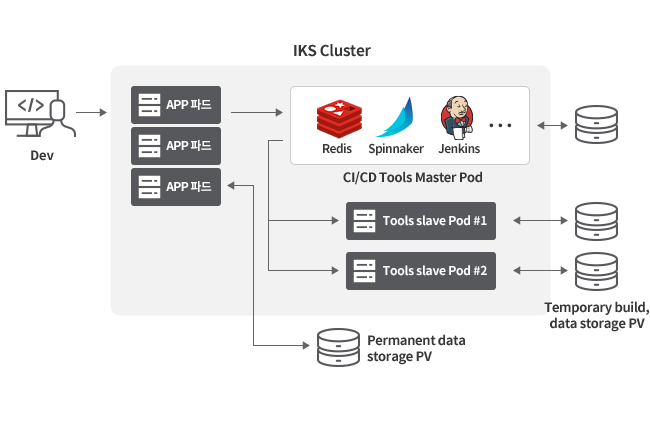
In this case, you can use Persistent Volumes (PVs) to permanently store and use data.
Maintain your essential DC or CI/CD within Persistent Volumes even if the pods are deleted.
PV also enables you to speed up your work. Typically, the test speed of the service environment can be improved.
It is because storing temporary builds in the PV reduces repetitive tasks and makes faster deployment possible.
| Category | Monthly fee (KRW, VAT excluded) |
|---|---|
| Cluster | 100 won/hour |
| Nodes (VMs) | An hourly rate is charged based on the node (VM) specification that is created. |
Consult a Kubernetes expert.
Are you at a loss about how to get started with Kubernetes and how to configure it?
If so, consult an IXcloud engineer who is certified as a Certified Kubernetes Administrator (CKA) about it.
For Transformation to Kubernetes, IXcloud is here to help.



